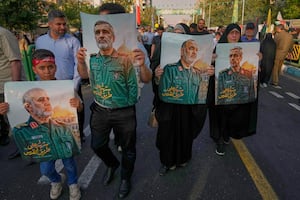Israeli Prime Minister Benjamin Netanyahu has launched a high-stakes military campaign against Iran – an initiative that not only undermines US President Donald Trump’s stated objective of negotiating a diplomatic resolution to Iran’s nuclear programme, but also risks entangling the Americans in another protracted conflict in the Middle East.
This escalation imperils regional energy infrastructure, reinforces Tehran’s rationale for nuclear deterrence and inadvertently could legitimise the Islamic Republic’s long-standing narrative portraying Israel as the existential adversary of Iran and Iranians.
Mr Netanyahu’s calculus is strategically comprehensible. Deprived of its most capable non-state proxy, Lebanese Hezbollah, and with auxiliary Iran-backed militias across Syria and Iraq demonstrating operational ineffectiveness, Iran finds itself unable to impose credible deterrent costs on Israel. Its indigenous missile capabilities remain largely incapable of penetrating multi-layered and integrated air defence systems of Israel and its allies. Furthermore, Iran’s own air defences are porous, leaving it vulnerable to precision strikes.
From Mr Netanyahu’s perspective, this moment presents a rare opportunity. Should Iran escalate matters – by targeting regional energy assets to internationalise the crisis or retaliating against US forces in the region – Israel hopes for direct American involvement. Thus, it is plausible that Mr Netanyahu’s war aims extend beyond the degradation of Iran’s nuclear infrastructure. His objectives may include leadership decapitation, regime collapse and perhaps even the fragmentation of the Iranian state through civil strife.
Indeed, Mr Netanyahu has goaded the Iranian public to stand up against Tehran’s ruling class. And although Israeli Foreign Minister Gideon Saar later insisted that regime change is not his government’s goal, US officials have since leaked information that Mr Trump vetoed an Israeli plan to assassinate Iran’s supreme leader, Ayatollah Ali Khamenei.
In any case, Israel’s high-risk strategy against Iran could end up becoming an open-ended conflict beyond its control. Mr Netanyahu may have persuaded Mr Trump that sustained Israeli military pressure would compel Tehran to give greater concessions in the nuclear negotiations with the US. Yet Iran has suspended all talks, and Mr Khamenei – while notably omitting criticism of the US in his initial reaction – appears to be recalibrating his government’s strategic posture. Mr Trump, for his part, praised the Israeli strikes as “excellent”, but there is no clear indication that he intends to commit US forces to a full-scale regional war.
More significantly, Israel’s pre-emptive strike may have fundamentally shifted Iran’s nuclear doctrine. In the aftermath of Iraq’s invasion of Iran in 1980 and Baghdad’s use of ballistic missiles against Iranian population centres, Tehran launched its missile development programme as a deterrent. Today, the inability to deter or respond meaningfully to Israeli aggression could catalyse a similar doctrinal evolution.
This trajectory involves adopting a policy of nuclear latency or outright breakout, akin to North Korea’s path. Pyongyang’s acquisition of a rudimentary nuclear arsenal – despite global isolation and sanctions – enabled it to deter foreign intervention and preserve regime continuity. Iran’s probable goal will be to assemble – and potentially test – a nuclear device to alter the regional strategic balance.
A dual-capacity arsenal, capable of both signalling and retaliation, would enable Tehran to deter future existential threats. However, this would mean absorbing sustained Israeli strikes, overcoming technical blows to its nuclear programme, surviving leadership decapitation attempts, navigating potential ethnic insurgencies backed by external actors, and enduring severe economic attrition for a prolonged period – potentially six to 12 months.







































This scenario recalls the incremental degradation of the Iraqi state in the 1990s, which ultimately culminated in a full-scale US ground invasion to remove Saddam Hussein. Barring a comparable deployment of US ground forces in Iran, the Islamic Republic’s coercive apparatus may be sufficient to retain control over any potential domestic unrest.
In parallel, Iran may adjust its asymmetric deterrence doctrine by shifting focus from hardened Israeli targets to vulnerable energy and commercial assets in the Arabian Gulf. Regional hydrocarbon infrastructure could be targeted as part of a coercive strategy to compel de-escalation. Tehran may be willing to absorb reciprocal attacks against its own oil infrastructure in exchange for imposing strategic and economic costs on its Arab neighbours and the global energy market in the hope of mobilising international pressure on Israel to stop the war.
Moreover, Mr Netanyahu may have inadvertently resolved a core ideological problem within the Islamic Republic’s anti-Israel narrative. Iran and Israel, historically non-contiguous and without direct territorial disputes, have long had a pragmatic history of co-operation – both under the Pahlavi monarchy and even during the early years of the Islamic Republic, when Israel supplied Iran with US-origin arms during the Iran-Iraq War from 1980 to 1988.
The Islamic Republic’s anti-Zionist posture often rang hollow with ordinary Iranians, who struggled to identify a direct threat from Israel. Now, with Israeli munitions striking Tehran, killing civilians and targeting critical infrastructure, Israel’s role as an adversary has acquired visceral legitimacy among the Iranian populace.
Ultimately, Iran’s decision-making in the coming weeks will be driven by regime survival imperatives in an increasingly precarious operating environment. Mr Netanyahu’s gamble may have thrown Israel, Iran and the entire region in an open-ended conflict beyond Israel’s control.



